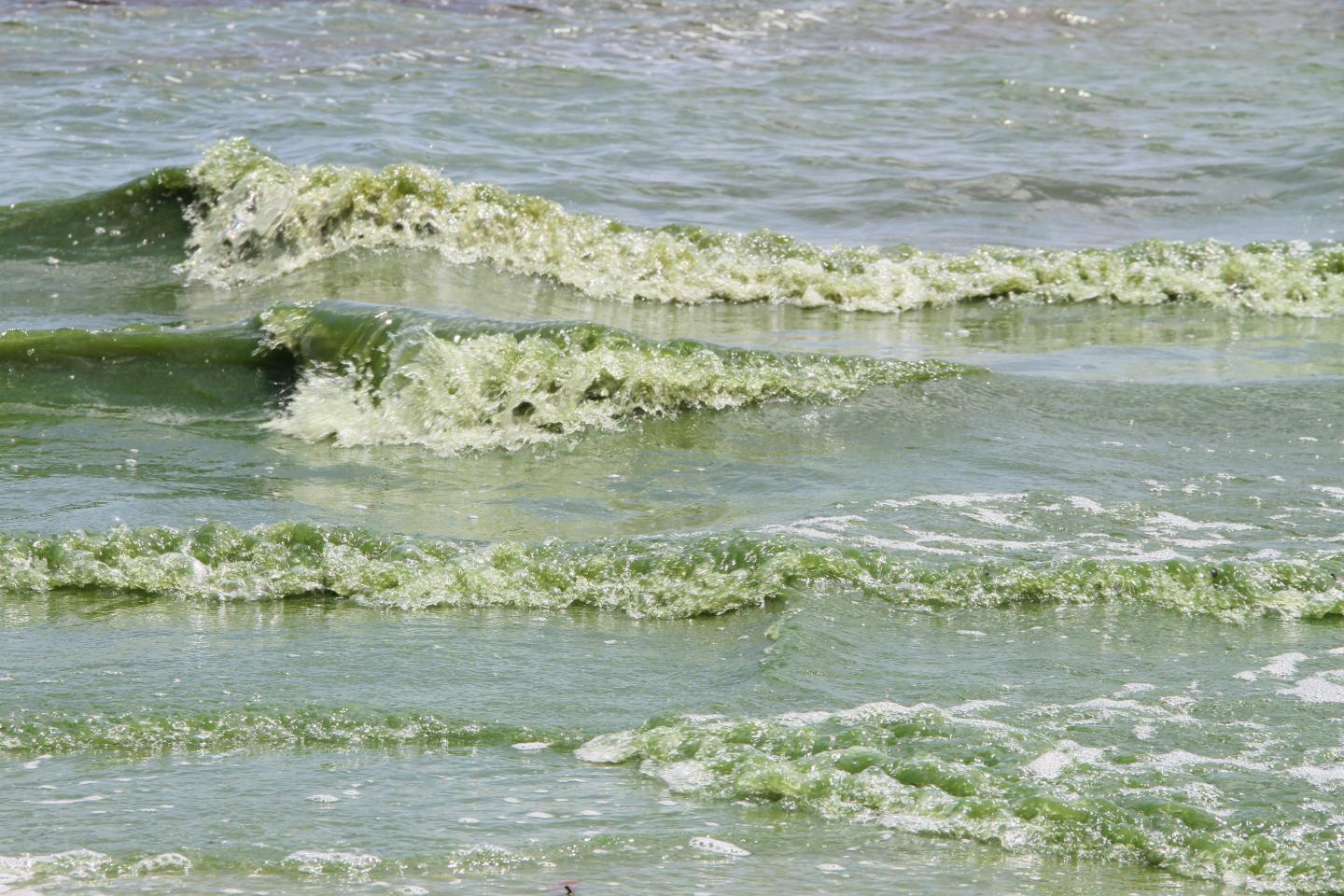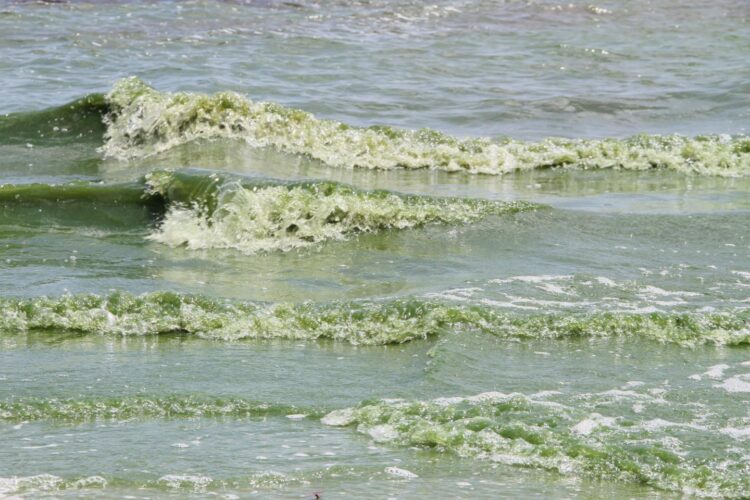Study will provide preliminary exploration of possible increased susceptibility in those infected with COVID-19

Credit: Florida Atlantic University
Florida has experienced numerous harmful algal blooms (HABs) in recent years. During these blooms, species of cyanobacteria release toxic peptides, including microcystins and nodularin into waterways. Human exposure comes from ingestion, direct skin contact or inhalation, and can lead to a variety of symptoms ranging from gastroenteritis, nausea, allergic reactions and skin rashes to hepatic injury in more severe cases. Despite multiple occurrences of red tide and blue green algae in Florida waters, the understanding of the health effects of exposure to these blooms remains limited.
Researchers from Florida Atlantic University’s Christine E. Lynn College of Nursing and Harbor Branch Oceanographic Institute have received a $319,976 grant from the Florida Department of Health (FDOH) to evaluate the short- and long-term health effects of exposure to HABS in Florida. Researchers will use a collaborative, multisite approach in collaboration with Florida Gulf Coast University.
Measuring concentrations of HAB toxins in the environment and in multiple human tissues will fill an important data gap in understanding the effects of exposures to HABS, particularly airborne toxins. The research project expands upon pilot studies conducted by FAU in 2018, and an FDOH study funded this past year.
For the study, participants will be recruited from three sites: the greater Fort Myers region (Cape Coral), Clewiston and Stuart in order to capture key areas of human exposure and a wide demographic population profile. Researchers will recruit and re-study the 110 participants sampled during the non-bloom period and recruit and study an additional 50 participants during non-bloom and bloom periods in 2021.
Researchers will conduct environmental water sampling for microcystins and brevetoxins as well as individual and area aerosol sampling for HABs toxins to determine potential health impacts of exposure to these toxins. They also will develop a bio-repository and participant registry for samples obtained during population assessments to establish an ongoing infrastructure to support future long-term studies on the health effects of exposure to HABs.
In addition, researchers will evaluate the potential effect of exposure to SARS-CoV-2 virus, the causative agent of COVID-19, on susceptibility to HABs and health outcomes that are being evaluated in this study population.
“A science-based understanding of the risks associated with exposure to harmful algal blooms can assist regulators in making health-protective decisions and guiding mitigation efforts to reduce the occurrence and distribution of the blooms,” said Shirley Gordon, Ph.D., principal investigator and a professor in FAU’s Christine E. Lynn College of Nursing. “In addition, this study provides a preliminary exploration of a potential increased toxin susceptibility in individuals who have been infected with the COVID-19 virus, which may constitute a new, sensitive subset of the population.”
Participants will be asked to complete a health questionnaire that records the site, frequency and types of potential HABs exposures. Other questions will include a medical history and self-reported symptoms to evaluate associations with exposure and potential dose. Participants also will be asked to provide a blood sample, urine sample and a nasal swab. Blood will be used to assess liver function, and urine and nasal swabs will be used to screen for microcystins and brevetoxins.
FAU is collaborating with the United States Centers for Disease Control and Prevention to develop laboratory testing methods for blood. Water and air samples will be obtained to measure HABs toxin concentrations at the sites of exposure to blue-green algae (all sites) and red tides (Cape Coral).
###
About the Christine E. Lynn College of Nursing:
FAU’s Christine E. Lynn College of Nursing is nationally and internationally known for its excellence and philosophy of caring science. The college is ranked No.1 in online graduate nursing programs in Florida and No. 23 in the nation by U.S. News and World Report. In 2017, with a 100 percent pass rate on the National Council Licensure Examination for Registered Nurses (NCLEX-RN®), FAU BSN graduates, first-time test takers, ranked among the highest (No.1) in Florida and the United States. FAU’s Christine E. Lynn College of Nursing is fully accredited by the Commission on Collegiate Nursing Education (CCNE). For more information, visit nursing.fau.edu.
About Harbor Branch Oceanographic Institute:
Founded in 1971, Harbor Branch Oceanographic Institute at Florida Atlantic University is a research community of marine scientists, engineers, educators and other professionals focused on Ocean Science for a Better World. The institute drives innovation in ocean engineering, at-sea operations, drug discovery and biotechnology from the oceans, coastal ecology and conservation, marine mammal research and conservation, aquaculture, ocean observing systems and marine education. For more information, visit http://www.
About Florida Atlantic University:
Florida Atlantic University, established in 1961, officially opened its doors in 1964 as the fifth public university in Florida. Today, the University, with an annual economic impact of $6.3 billion, serves more than 30,000 undergraduate and graduate students at sites throughout its six-county service region in southeast Florida. FAU’s world-class teaching and research faculty serves students through 10 colleges: the Dorothy F. Schmidt College of Arts and Letters, the College of Business, the College for Design and Social Inquiry, the College of Education, the College of Engineering and Computer Science, the Graduate College, the Harriet L. Wilkes Honors College, the Charles E. Schmidt College of Medicine, the Christine E. Lynn College of Nursing and the Charles E. Schmidt College of Science. FAU is ranked as a High Research Activity institution by the Carnegie Foundation for the Advancement of Teaching. The University is placing special focus on the rapid development of critical areas that form the basis of its strategic plan: Healthy aging, biotech, coastal and marine issues, neuroscience, regenerative medicine, informatics, lifespan and the environment. These areas provide opportunities for faculty and students to build upon FAU’s existing strengths in research and scholarship. For more information, visit http://www.
Media Contact
Gisele Galoustian
[email protected]
https://scienmag.com/fau-receives-florida-department-of-health-grant-to-study-health-effects-of-harmful-algal-blooms/




